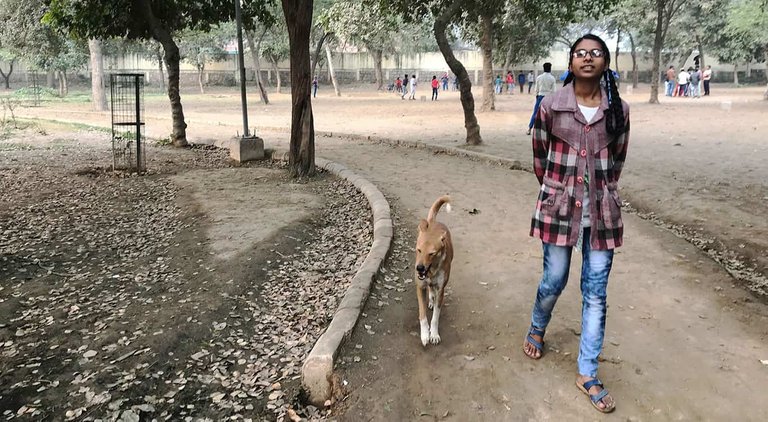"I call them Gaon rules," said Nikki Sharma, as she skipped from one dry spot to another along the waterlogged streets of Sangam Vihar, the densely packed settlement along Delhi's south-eastern border.
Gaon — or village — rules, Nikki made clear as she listed them out, applied only to girls. Boys could do whatever they wanted to.
"Gaon Rule One: Girls must wake up early, do all the housework and only then can they go to school.
"Gaon Rule Two: When school ends a girl must come straight home to do more housework.
"Gaon Rule Three: On days when girls don't have school, they sit at home.
"I lived in a gaon till Class 6, that's how I coined the term," Nikki said as she emerged from a shaded alleyway into Sangam Vihar's only public park. Later, when she moved to Delhi with her parents, Nikki realised — to her annoyance — that city rules felt a lot like gaon rules.
In March, Nikki and the rest of the Class of 2018 shall sit for their Class 12 board exams, marking the conclusion of their school lives. While she looked forward to the promised freedom of adulthood, Nikki reflected on how the relentless control over her movement has meant girls like her have led largely indoor lives, shuttling between classrooms, tuition centres, and their homes.
Something as simple as a walk in a park, as a break from studies, involves planning and permissions.
"This is Batra Park, our only park," she said, gesturing to the sunny half acre of trees, meandering flowerbeds and patchy grass where Sangam Vihar's residents go to seek refuge from each other. "I like it here, but I haven't come here for almost a year."
Why?
Gaon Rules.
Parental concerns about safety mean that the walk to and from school is the sole respite for Delhi's school girls, who lead largely indoor lives.
Why loiter?
Sangam Vihar is a dense mesh of small, irregular shaped homes that sprung up in the 1980s when enterprising farmers on the city's outskirts cut their fields into tiny plots and sold them off to migrants looking for work in the national capital.
Over the next three decades, as the city's population boomed, Sangam Vihar grew from a cluster of huts into a sprawling settlement. The colony was not authorised by any municipal authority, so Sangam Vihar expanded without basic infrastructure like water, electricity or sewerage — and also, without any public recreational spaces.
While city administrators have retro-fitted urban amenities, the shortage of space has made it impossible to create enough public infrastructure like parks where girls and women can free themselves from the encumbrance of the classroom, the kitchen, the workplace, and their families, to simply be by themselves.
Meanwhile, the city's poor record of crimes against women has meant parents often couch their concerns in the language of safety.
"Every little girl is brought up to know that she must walk a straight line between home and school, home and office… from one 'sheltered' space to another," write Shilpa Phadke, Sameera Khan and Shilpa Ranade in their book 'Why Loiter?'. "When a society wants to keep a woman safe it never chooses to make public spaces safe for her."
Nikki Sharma with her mother Rekha, her younger sister Nisha, and her father Luvkush.
By god's grace
"I called four of your friends this afternoon," Nikki's mother Rekha said, when Nikki took longer than usual to come home from school one day in January. "I was worried about you." "Ma, I was at a puja," Nikki replied, explaining that a friend's family had organised a ceremony to honour Saraswati, the Hindu goddess of learning.
Given the restrictions on their movement, Why Loiter? notes, women often seize upon religious events as a rare opportunity to leave their homes. Tuitions, English language classes, and the walk home from school offer similar opportunities.
"Sometimes, I take a longer route home from school just to relax," Nikki said. She peeks into shops, she reads signboards, she pets street dogs. "I watch children play in the streets. I envy their freedom."
Rekha insisted she never restricts her daughter's movements. "Other parents worry about what other people will say if their daughters are seen wandering in the streets. I don't."
"That's because Ma knows I won't wander," Nikki said later. "It is impossible to go anywhere without people spying on you."
On the rare occasions when she is out by herself, Nikki invariably bumps into one of her mother's friends. "Then the first they ask me is — What are you doing outside the house?"
Congratulations @harshohri! You have completed some achievement on Steemit and have been rewarded with new badge(s) :
Click on any badge to view your own Board of Honor on SteemitBoard.
For more information about SteemitBoard, click here
If you no longer want to receive notifications, reply to this comment with the word
STOPCongratulations @harshohri! You received a personal award!
Click here to view your Board
Do not miss the last post from @steemitboard:
Congratulations @harshohri! You received a personal award!
You can view your badges on your Steem Board and compare to others on the Steem Ranking
Vote for @Steemitboard as a witness to get one more award and increased upvotes!